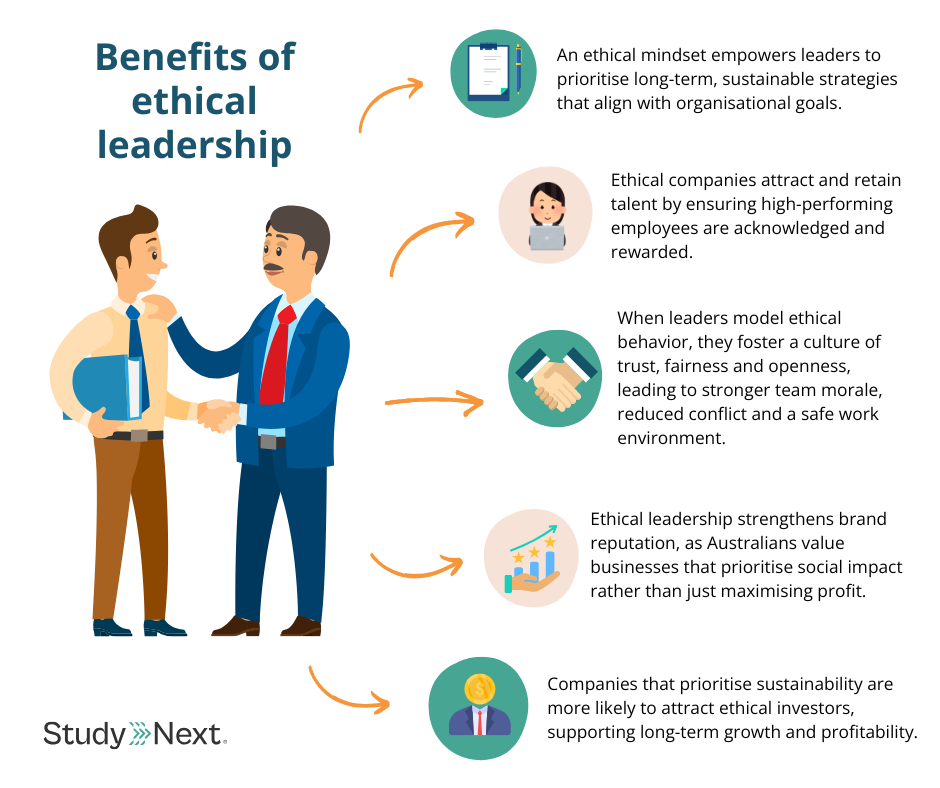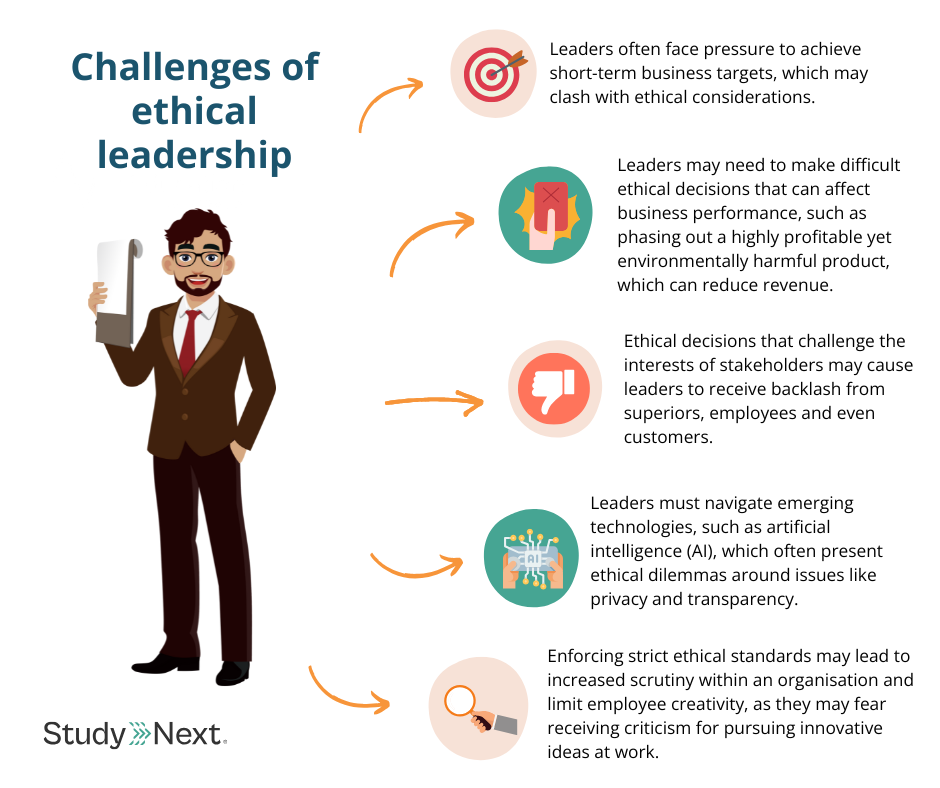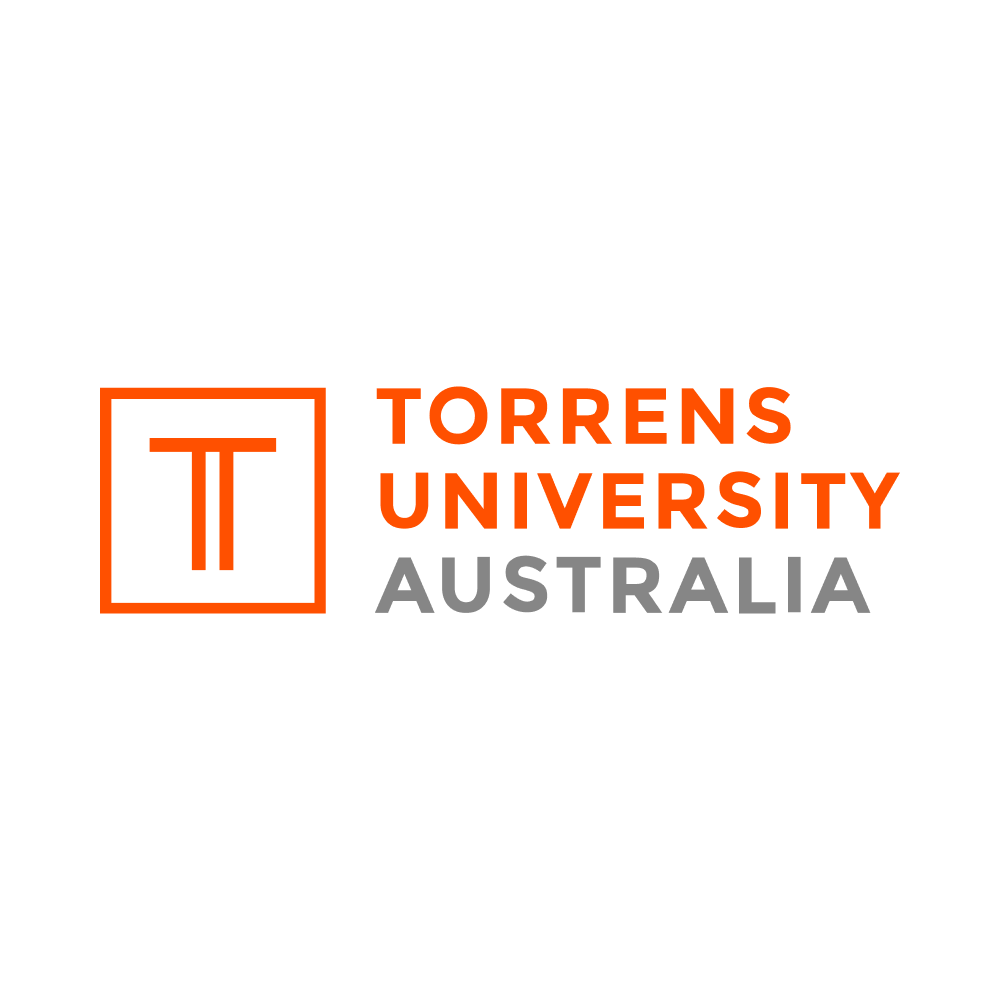In This Article

Ethical leadership in the modern business era is considered to be a crucial part of business strategy, but in what way? In this article, we discuss the qualities of an ethical leader, the advantages and challenges of ethical leadership, as well as how you can lead with integrity.
We also explore postgraduate courses that feature ethics-focused units designed to develop your skills to navigate ethical challenges at work.
What is ethical leadership?
Ethical leadership is a leadership approach centred on core values like integrity, justice and responsibility. It focuses on doing what’s right, with leaders respecting the dignity and rights of all individuals in the workplace. When making business decisions, ethical leaders prioritise what serves the greater good of the organisation, even when those decisions aren’t the easiest or less profitable.
These leaders practice good values even when they’re not observed by others. Serving as role models, ethical leaders promote positive behaviours at work to build a culture of trust, transparency and high moral standards. They work to ensure that fairness, rather than office politics, guides teams within an organisation.
Characteristics of an ethical leader
Ethical leaders uphold values like fairness, integrity and empathy in everything they do at work. They prioritise the wellbeing of their organisation and its people, striving to cultivate a positive work environment where everyone can thrive. Their key traits include the following:
Honesty
Transparency and truthfulness are important characteristics of ethical leadership. Open communication helps build a culture of trust among employees. When leaders are dishonest, it can damage their credibility and cause others to regard them as unreliable.
Integrity
Ethical leaders need a strong moral compass and should act consistently with their values and principles, especially when facing difficult situations at work. Not only does this guide ethical decision-making, but it also strengthens their reputation among employees, clients and stakeholders.
Justice
Treating everyone in a fair manner and without bias is an essential trait of an ethical leader. They ensure that good work is recognised and rewarded, while those who violate work regulations are held responsible.
Accountability
Ethical leaders acknowledge their mistakes and take responsibility for their decisions, even when the outcomes are negative. They also promote a culture where employees at all levels are accountable for their actions.
Respect
Being respectful involves listening actively, understanding different perspectives and treating others with dignity. When leaders demonstrate this through their actions, it creates a safe and comfortable work environment where employees feel supported to work their best.
Courage
Doing what’s right often requires courage, especially in a leadership position. Ethical leaders may face criticism or resistance for their decisions, but they still stand by their principles and values.
Empathy
Ethical leaders demonstrate empathy by caring for the wellbeing of others. They’ll consider the needs and perspectives of their employees and stakeholders when making decisions, balancing business priorities with their impact on people.
Benefits of ethical leadership
Ethical leadership offers many advantages, including enhanced decision-making, improved team morale and a stronger brand reputation. It builds a healthy work environment that benefits not only the leader but also the organisation and its people, which can lead to a better overall business performance. Find out more below:

Improves decision-making
Having an ethical mindset allows leaders to prioritise long-term success over short-term gains. By considering the broader impact of their decisions, they’ll be able to develop more sustainable business strategies that align with organisational goals and positive social outcomes.
Attracts and retains employees
Gartner’s 2024 Global Talent Monitor survey, which involved 854 Australian workers, revealed that ethics ranked among the top 10 drivers of employee attraction. This demonstrates how employees recognise the long-term value of working with ethical companies. Ethical leaders also ensure that high-performing workers are rewarded, which can promote greater productivity and reduce employee turnover.
Builds an inclusive work environment
When leaders promote ethical behaviour, it encourages employees to follow the same standard as well. This positive influence can cultivate a workplace culture built on honesty, fairness and respect. In this setting, employees are more likely to trust each other and their leaders, which can reduce conflict and improve team morale. Employees can also feel assured that they can raise concerns without fear of judgment or punishment.
Enhances brand reputation
Organisations guided by ethical leadership are more likely to resonate with Australians. According to the 2024 The Good Study by Leo Burnett in partnership with the UTS Business School and Zenith Media, 96 per cent of Australians believe it’s crucial for brands to contribute positively in today’s world. 65 per cent of them also think that businesses shouldn’t focus solely on making profits, but also make a positive impact on society. This highlights how leaders who strive to build ethical organisations can strengthen their brand reputation, as Australians value businesses that prioritise doing good.
Attracts investors
Many investors are increasingly factoring in environmental, social and governance (ESG) when making investment decisions, based on the findings from the Australian Securities Exchange’s Australian Investor Study in 2023. The report found that nearly two-thirds of retail investors are open to making investments that prioritise sustainability. This demonstrates that companies that actively avoid causing social or environmental harm are more likely to attract and secure ethical investors, helping them improve business growth and profitability.
Challenges of ethical leadership
Ethical leadership usually faces several key challenges at work, including navigating moral dilemmas, balancing business goals with ethical concerns and being firm in upholding ethical standards. Below are some common challenges that ethical leaders may face:

Pressure to hit business targets
Leaders frequently face pressure to meet short-term business targets, such as quarterly financial goals or growth milestones. These expectations can sometimes clash with ethical principles, as the urgency to deliver immediate results may lead to business decisions that jeopardise transparency and long-term sustainability.
Responsibility to make difficult decisions
Leaders often have to make business decisions that impact overall company performance. These decisions become especially challenging when upholding ethical values can affect profitability. For example, an ethical leader may decide to phase out a highly profitable yet environmentally harmful product, fully aware that this could lead to a short-term decline in revenue.
Potential of receiving backlash
Leaders who make ethical decisions that conflict with the interests of stakeholders may cause them to receive backlash from key stakeholders, such as superiors, workers and even customers. This resistance may occur when superiors are concerned about short-term profit, employees are not convinced with proposed changes to established workplace practices or customers are not happy with changes to product offerings.
Challenge of managing ethics in emerging technologies
Ethical leaders need to carefully navigate the challenges brought by emerging technologies, such as artificial intelligence (AI), which often present ethical dilemmas related to privacy and transparency. They must ensure that implementing these technologies can bring innovation to the business without causing unintended harm to employees, customers and the organisation.
Possibility of restricting employee creativity
Upholding strict ethical standards at work can lead to heightened scrutiny throughout an organisation, which may stifle employee creativity. Employees may become hesitant to take risks and think outside of the box when their innovative ideas are heavily scrutinised.
How does unethical conduct impact the workplace?
Unethical conduct in the workplace can have serious negative consequences for an organisation and its employees, as it often leads to a lack of trust among colleagues, a decline in team morale and reduced productivity. Over time, these issues can affect overall company performance and potentially lead to reputational harm, legal consequences and financial losses.
Unethical behaviour can take form in many ways at work, such as discrimination, exploitation, corruption or misusing company property. When these matters are left unchecked by leadership, they contribute to a toxic work environment that encourages complicity and discourages workers from speaking up against injustice. As a result, the organisation is more likely to experience a decrease in employee engagement and higher turnover rates.
Beyond internal impacts, unethical conduct can also cause damage to a company’s reputation and brand among clients, customers and other stakeholders. In today’s business world where integrity is expected, companies that are found to be unethical or exposed in public scandals risk losing business opportunities, investors and credibility. They may also face major legal and financial consequences. Once their reputation is tarnished in the public eye, it may take years for them to recover and rebuild trust.
Examples of ethical companies in Australia
The following examples highlight how Australian companies are striving for social impact as part of their ethical commitment:
Telstra
In 2024, Telstra became the first Australian organisation to join the United Nations Educational, Scientific and Cultural Organisation (UNESCO)’s Business Council to advocate its Recommendation on the Ethics of Artificial Intelligence, the first-ever global standard on AI ethics. This framework promotes the development and implementation of AI technologies grounded in human rights, dignity and environmental sustainability.
The telecommunications company has also previously collaborated with the federal government to pilot and test Australia’s AI Ethics Principles, a national framework designed to guide businesses and governments to uphold the highest ethical standards in the design, development and deployment of AI.
Orica
Australian manufacturing and mining solutions provider Orica announced in 2023 that its Kooragang Island Decarbonisation Project in Newcastle had cut greenhouse gas emissions from its three nitric acid plants by at least 98 per cent, representing nearly half of the site's total emissions and 11 per cent of all chemical industry process emissions nationwide.
In recognition of its sustainability efforts, Orica received top honours at the 2024 Australian Financial Review Sustainability Leaders Awards, winning in the Resources, Energy and Utilities category and the Overall Impact award.
BHP
In 2024, multinational mining and resources company BHP demonstrated its commitment to diversity, equity and inclusion (DEI) by launching a Disability Action Plan designed to foster greater accessibility and inclusion for people with disabilities in its workplace. The company also reached a major milestone in April 2025 by achieving 40 per cent female representation across its global workforce, a significant increase from just 16 per cent in 2016. This reflects its ongoing dedication to promoting gender equity.
These initiatives are often only made possible when leaders practice ethical values. For more ethical leadership examples in real life, you can read this article highlighting companies that prioritise doing good.
How to become an ethical leader
To become an ethical leader, you should commit to demonstrating integrity, empathy and accountability to build a positive workplace culture within your organisation. There are many ways to practice these values, such as the following:
-
Develop an ethical decision-making framework
Leaders often need to balance business priorities, stakeholder interests and other pressures when making high-stakes ethical decisions. Establishing a clear decision-making model helps you to consider various angles. This may involve identifying the main ethical issue, outlining possible actions you can take and examining relevant regulations, contractual obligations and ethical guidelines.You can also seek advice from experts and gather input from relevant stakeholders to get different perspectives. This can help you share the decision-making burden and make better-informed decisions based on all available resources.
-
Practice open communication
It’s important to foster a culture where honesty is encouraged and employees feel safe to speak up about ethical concerns without fear of being punished. You can lead by example by actively listening to others, welcoming feedback from employees at all levels and engaging in meaningful discussions to understand and solve problems within the company.Fostering open communication can also involve being transparent about organisational changes, whether they involve celebrating successes or addressing challenges. This builds trust and makes employees feel included and valued.
-
Enforce the code of conduct in the workplace
As a leader, striving to do the right thing all the time means ensuring that your subordinates are held to the same standard. Everyone at work should adhere to the organisation’s code of conduct and those who commit ethical violations should face appropriate consequences.Upholding these rules can also reduce risks and prevent any illegal activities that may cause reputational harm, legal issues or financial loss. This helps to demonstrate your expectations of yourself and others on how everyone should act to build and maintain a safe and trustworthy work environment.
-
Avoid conflicts of interest
You can promote the values of transparency and integrity by actively avoiding conflicts of interest. As an ethical leader, you must put the company’s best interests above yours and steer clear of making decisions that could potentially benefit you at the expense of the organisation. It’s also important to establish clear company policies regarding the acceptance of gifts and event invitations from clients. This is to help distinguish whether the gift is a gesture of goodwill or an attempt to influence business decisions. By demonstrating this, you can set an example for others and encourage a workplace culture where fairness is practised in every decision. -
Be courageous in your leadership
Ethical dilemmas often don’t have clear-cut solutions. You may reflect and wonder if your decision as a leader is the right thing to do. Even when you’re confident that it’s the right choice, you and your team may experience negative consequences as a result of being ethical. Despite this, it’s crucial for you to have courage in doing what you feel is best for the organisation and its people. It demonstrates your integrity and conviction, which can improve your reputation among employees, clients and other stakeholders. -
Pursue ethics training
You can take ethics training by attending industry workshops and seminars, participating in internal training programs offered by your organisation or pursuing further study through courses that integrate ethics as part of their curriculum.
You can improve your knowledge and skills to address ethical challenges within your organisation by undertaking ethics training. This type of training can equip you with the right tools to make informed decisions that align with business goals and ethical standards. It can also help you stay informed about the latest developments in ethical challenges related to technology and evolving regulations.
Study ethics as part of your postgraduate course
Studying ethics in a postgraduate course is highly beneficial for you to build skills in critical thinking and decision-making to navigate ethical dilemmas in your career. You can find plenty of postgraduate programs in Australia across various disciplines that incorporate ethics in their syllabus, ensuring that you’re ready to take on business challenges while prioritising social good.
The University of Wollongong's (UOW) Master of Financial Technology includes an Ethics and Regulation in FinTech unit, which covers key topics in digital information regulations, such as AI, big data and digital privacy. In this unit, you’ll gain an understanding of the evolving regulatory framework that shapes technology-driven financial innovation, with a focus on business and professional ethical standards.


The Master of Financial Technology is aimed at students aspiring to pursue a career within the growing FinTech field covering the impact of technology and its impact on banking and the global payment systems, the insurance industry and trading in financial markets.
Throughout the degree, you will undertake subjects in data programming, information visualisation and machine learning, explore case studies, engage with industry partners and apply your knowledge in a fintech research project.
One of the units in the Master of Marketing course at the University of Western Australia (UWA) is Ethics and Sustainability Management, which aims to equip you with the knowledge and skills to identify and address ethical problems, not only as an aspiring manager but also as a person. You’ll learn a wide range of moral and ethical principles, engage in ethical reflection while factoring in stakeholder needs and justify ethical decisions with confidence.


Marketing focuses on making and keeping customers by finding, communicating and sustaining the competitive advantage that makes a company truly successful. Topics covered in Marketing include advertising, company strategy, competitive analysis, and value creation.
Marketing students at UWA have the opportunity to undertake projects for real-life organisations and have previously worked with companies including Coles, Google, Microsoft, Rio Tinto, Tourism WA, Transperth and Westpac.
With classes available during the day and in the evening, this course is suitable for both the busy professional and the full-time student.
The Master of Artificial Intelligence course at the University of Technology Sydney (UTS) offers a Professional stream for students, which features the Ethics of Data and AI unit. It delves into the ethical dilemmas that occur when AI systems are used in decision-making processes across various industries, with key considerations including transparency, fairness and algorithmic bias. You’ll also examine case studies related to data ethics, accountability and regulation.


The Master of Artificial Intelligence program provides IT and computing professionals with the opportunity to upskill and meet the demands of this rapidly changing field. The course covers a broad range of current and emerging areas of AI including data analytics, neural networks, deep learning, reinforcement learning and ethics in AI. The course provides specialised subjects in areas including computer vision and natural language processing to meet the growing industry demand for AI professionals with advanced technical capabilities and understanding of the risks and opportunities in this growing field.
This course provides ideal preparation for graduates seeking careers in AI and its related domains. Students in the course engage in practical, hands-on learning, using technologies to develop algorithms in various AI approaches.
Queensland University of Technology's (QUT) Master of Business (International Business) offers an Ethics and Professional Relationships unit, designed for students wanting to pursue a career in a business field like accounting or financial planning. The unit explores ethical capabilities essential for professionals providing financial advice and accounting services. You’ll also develop your verbal and non-verbal communication skills to engage with clients and other stakeholders effectively.


This program has been designed to enhance your real-world knowledge and skills in international business, preparing you to advance your career and take on leadership positions. Throughout this program, you’ll gain expertise in various facets of international business, covering trade procedures, logistics, negotiation techniques, languages, regional understanding and offshore business strategies.
As you delve further into this program, you'll explore the complexities of international business. This includes understanding how businesses operate in the global economy, gaining insights into the challenges and opportunities brought about by diverse markets and the growth of globalisation. Additionally, you'll learn about the nature and role of business operations in the international value chain, as well as the management and control of international business operations.
Developed in collaboration with industry experts, this program seamlessly integrates real-world case analysis, hands-on activities and workplace projects. Throughout the program, you'll engage in practical experiences, working alongside leading international organisations to develop viable solutions that support their global business expansion. To accomplish this, you'll develop skills in creativity, independent judgmentt and critical reflection. Additionally, you'll learn to proficiently plan, design, adapt and implement strategies and solutions that actively contribute to both business practices and ongoing research.
Torrens University Australia’s Master of Business Administration, Innovation and Leadership features an Ethics and Decision Making unit, which delves into various ethical standards that must be considered when making decisions within businesses or organisations. While many moral principles are shared across cultures, others can vary depending on context, as well as local and individual circumstances. In this unit, you can enhance your skills to examine these complexities and make informed ethical decisions accordingly.


The Master of Business Administration (MBA) in Innovation and Leadership develops practical skills for today's business challenges.
Over the course of your study, you will be working on real projects with real commercial impact, while gaining exposure to some of the most successful and important organisations in the country. By working on projects with the university's industry partners, you’ll gain unprecedented insight into modern business challenges and the practical skill set to tackle these challenges head-on. This MBA program is structured around three major projects with industry partners.
The Senior Executive Master of Business Administration course at the University of Melbourne offers an Ethical Leadership unit, designed to explore corporate obligations to stakeholders and strategies for corporate social responsibility. This unit also provides insights into various methods of moral reasoning, their limitations and how ethical models can shape consumer buying behaviours.


Embark on immersive educational experiences in Melbourne, Asia, Europe and North America — exploring cutting-edge innovations shaping today's global business landscape.
The unique program structure maximises your learning while minimising disruption to your career and personal commitments. Spread over 18 months, each of the ten modules runs for nine days, covering a wide range of high-impact leadership skills. Melbourne Business School welcomes leaders from across Australia and overseas to apply.
Join a lasting and influential community of internationally-renowned faculty and senior executives from world-leading organisations operating at the highest level, united by a motivation to succeed.
Residential Stay
The program consists of 10 nine-day modules, including seven based at Melbourne Business School and three overseas. During the modules at Melbourne Business School, students will stay on campus from Saturday to the following Sunday.
This format lets students fully immerse themselves in the program, without the distractions of work and home. All students receive a private room with en suite and all meals are provided.
In the Master of Business Administration course at the University of the Sunshine Coast (USC), you’ll take on a Strategy, Governance and Ethics unit, which examines how stakeholders are involved in decision-making and how the UN Sustainable Development Goals (SDGs) shape strategic decisions and governance. You can develop your skills to think critically and act ethically, ensuring that organisational strategies align with stakeholder priorities.


Increase and deepen your range of management skills. This program covers the latest trends and influences in business and builds on your skills in critical thinking and analysis.
You will complete six courses in the fundamentals of accounting, economics, corporate finance, strategic management and marketing. Then choose six interest topics, including international trade and finance, entrepreneurship, global business management and research.
Boost your ethical awareness with a postgraduate business degree
Practising leadership ethics plays a crucial role in building a safe and positive work environment. Leaders who consistently choose to do what’s right not only inspire others to be the same but can also boost the company’s reputation and performance. Recognising the importance of developing ethical graduates in today’s business landscape, many universities embed ethics into their programs. Discover diverse postgraduate business courses offered by top institutions in Australia.






















